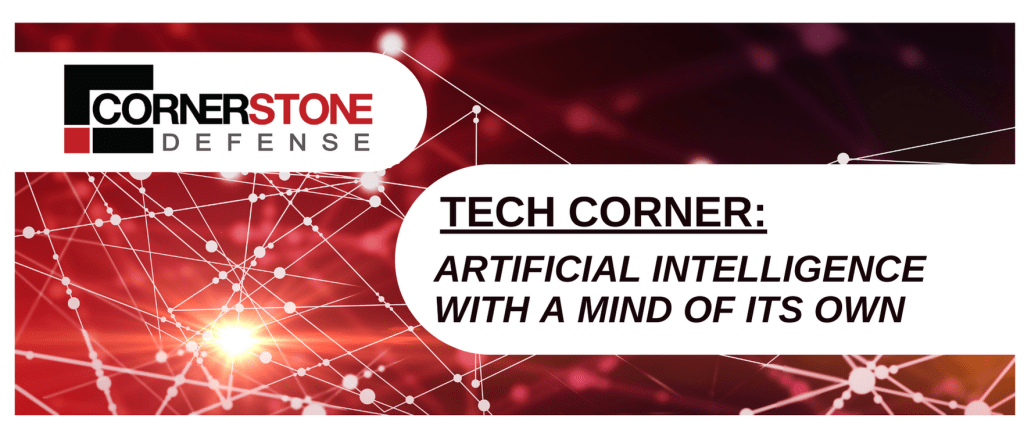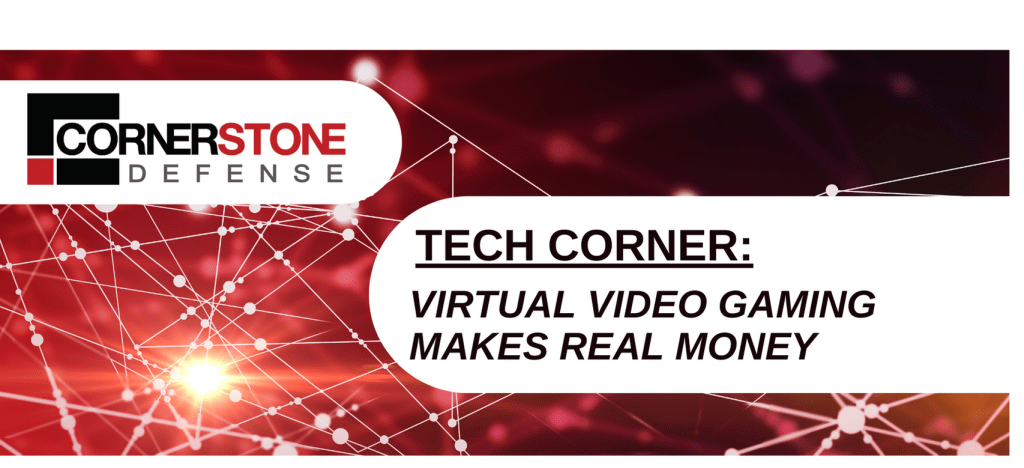
Building a Culture of Care at Cornerstone Defense
Written by: Reilly Leonard, COO, Cornerstone Defense

At Cornerstone Defense, we believe company culture is more than just a buzzword—it’s the heartbeat of our organization. While the dictionary offers numerous definitions of “culture,” we focus on one that resonates with our mission: “the values, typical practices, and goals of a business or other organization, especially a large corporation.”
Our Beginnings
When we launched Cornerstone Defense nearly a decade ago, our journey started in a small hotel conference room in Washington, D.C. Our goal was clear: to build a leading defense contracting company. But our true challenge—and passion—lay in crafting a company culture that stood out. Drawing from our collective industry experiences, we dedicated that weekend to defining what Cornerstone Defense should represent.
Our Values
We envisioned a company that genuinely cares. We aimed to embody the warmth and personal touch of a “mom and pop shop” while offering the vast opportunities typical of larger corporations. At Cornerstone Defense, every employee is seen as an individual, not just a number. Our commitment to being the employer of choice is reflected in how we support and value our team members.
Our Practices
Despite many of our employees working off-site, we strive to keep everyone connected. From breakfast and lunch meetings to happy hours and sporting events, we create regular opportunities for our team to come together. Our casual gatherings, like office cookouts and activities such as axe throwing and Topgolf, foster a sense of community. We want every employee to feel like an integral part of Cornerstone Defense, not just a cog in the machine.
Our Goals
Our primary goal has always been to create a workplace where people love to work. We believe that a strong, positive company culture is the key to our success. By making Cornerstone Defense an attractive place to work, we naturally drive growth and performance in our industry.
Our Commitment
As we’ve grown from a startup to a small business, and now transitioning to a mid-sized company, maintaining our culture has been paramount. Our culture evolves with us, shaped by the diverse, talented individuals who join our team. While we may not always get it right, we’re committed to trying new things and continuously improving.
Join the Conversation
We value your input and ideas on how we can enhance our company culture. If you have suggestions, please reach out to us—we’re here to listen and grow together. At Cornerstone Defense, we’re not just building a company; we’re building a community where everyone can thrive.
Elevating Corporate Social Responsibility Through Charitable Initiatives
Written by: Patrick Palmer, CEO, Cornerstone Defense

In the busy and dynamic landscape of any business or industry, the concept of giving back can sometimes take a back seat. Yet, for small businesses across many industries, there lies a profound opportunity to extend their impact beyond mere transactions. Beyond profit margins and competitive edges, lies a realm where businesses can serve as agents of positive change. Endeavors in charitable contributions and community engagement not only foster goodwill, but also play a pivotal role in building stronger, more resilient communities. Moreover, such initiatives cultivate a corporate ethos grounded in empathy and responsibility, bringing a workforce closer together as a part of something meaningful.
At Cornerstone Defense, our philosophy is to find charitable donation and philanthropy opportunities by inquiring about our employees’ preferred charities. Through our program, Cornerstone Gives Back, we have donated to charities ranging from cancer research (multiple charities), youth sports, stream clean ups, religious based charities, coastal conservation, academic fraternal organizations, and children’s charities. However, our sweet spot is, and has always been, supporting veterans and wounded veterans organizations. For the past 5 years, we have been honored to work with Hero Homes, for example, a local organization that contributes 100% of all donations (no overhead) to build homes for wounded veterans. Hero Homes is currently building their 6th house in 8 years.
This year we have teamed with another charity that supports our fallen veterans. The charity is called the 1162 Foundation and is named after the day President Kennedy commissioned the Navy Seals. 1162 Foundation was formed and is run by Commander Mike Hayes (Ret). Hayes is a former Navy Seal that fought with valor and distinction in multiple conflicts around the world. Hayes is an established leader who off the battlefield has lead meetings in the White House Situation Room, negotiated international arms treaties, and developed high impact corporate strategies. His leadership philosophy is always to strive to be better, to contribute more, and put others first.
Commander Hayes is also a best-selling author who penned the book “Never Enough”. As quoted from his website, in “Never Enough”, Hayes “recounts dramatic stories and offers battle and boardroom tested advice that will motivate leaders to do work of value, live a life of purpose, and stretch themselves to reach their highest potential.”
100% of the proceeds of Never Enough go to Gold Star Families. A Gold Star Family is the immediate family member(s) of a fallen soldier who died while serving in a time of conflict. If you would like to learn more about Goldstar Families, please use this link: https://www.hopeforthewarriors.org. I highly recommend reading Commander Hayes’ book. It is an impactful and inspirational look at strategic leadership and striving to be the best you can be.
As stated previously, our Cornerstone Gives Back Committee is always open to new opportunities and partnerships to make a difference in our communities, whether through volunteerism, charitable donations, or other means. If you are interested in such a partnership with Cornerstone Defense, we would love to hear from you and see if we can support your cause. Reach out today by dropping us a comment or sending a direct message on social media or by sending us an email at info@csdef.com. We hope to hear from you!
Written by: Kaitlin Krywy, Managing Director – Aerospace and Defense

As a small business committed to supporting the U.S. Government, Cornerstone Defense recognizes the immense potential it holds to positively impact society, especially in the support of veterans who have bravely served the United States of America. Small companies like Cornerstone Defense embody distinct qualities, notably agility and adaptability, which form the foundation of an approach uniquely suited to deeply impact the lives of veterans. In comparison to the national average of how many veterans comprise the workforce, which is 5.6%, Cornerstone’s workforce is currently 34% Veteran-comprised. We extend support to the Veteran community through various means while continually advocating for the advantages of hiring these exceptional individuals.
Employment Opportunities:
Veterans are a valuable asset, bringing a wide array of skills and experiences to any workplace. At Cornerstone Defense, we take pride in not just recognizing, but harnessing this diverse skill set, ensuring veterans find roles that perfectly match their talents. Through our extensive array of training and skills development programs, we are dedicated to guiding and aligning candidates with career paths that capitalize on their strengths and expertise.
Flexible Work Policies:
Creating a work environment that accommodates the potential challenges veterans might face during their transition is crucial. Flexible work hours, understanding leave policies, and support for managing any health-related issues or appointments contribute to a supportive workplace culture.
Collaboration and Shared Resources:
Through the establishment of mentorship programs and partnerships with veteran-focused organizations and groups, our company has been able to offer comprehensive guidance, training, and career development support. For instance, we’ve collaborated with the Mt. Carmel Veteran Center in Colorado Springs, empowering their career fair aimed at transitioning military personnel. Additionally, we remain dedicated to offering career mentorship and job opportunities to students at ACI Learning, ensuring ongoing support for veterans seeking to embark on new professional journeys. Our aim is to align their military-acquired skills with appropriate career trajectories, ensuring a smooth transition into civilian roles.
Support to Local Veteran Initiatives:
At Cornerstone, we actively support local veteran initiatives by contributing to fundraisers, participating in events, and advocating for awareness campaigns. We actively volunteer with a local group, HeroHomes Loudoun, building houses for those who have fought for our country. Through partnerships with veteran organizations and sponsorships of local events, we strive not only to raise awareness but also to provide concrete assistance to our veteran community.
As a company, we consider ourselves fortunate to have the opportunity to support and collaborate with veterans. Their unwavering dedication, exceptional skills, and selfless service to our country are an inspiration to us all. As we evolve and expand, we’re committed to ensuring that we provide support for our veteran workforce and continue to improve our efforts to support veterans. With that in mind, feel free to drop us a comment and join the conversation – we’d love to collaborate, hear new ideas, connect and work together as a community to continue supporting those that have already done so much for this great country.
Kaitlin Krywy
Managing Director – Aerospace and Defense

We take great pride in featuring Michelle Allen, our accomplished Director of Systems and Security, and Facility Security Officer, in this month’s executive spotlight. Michelle has been with Cornerstone Defense since 2018, and her career trajectory that led her to the Cornerstone team is a testament to her journey of adaptability, commitment, and pursuit of excellence.
Michelle earned a bachelor’s degree in International Studies with a minor in Spanish from George Mason University. However, after graduation, Michelle decided to further pursue studies in Accounting, which she had always been interested in. After working in banking for several years, Michelle expanded her areas of professional expertise by taking on roles in the fields of Accounting, Human Resources, Operations, Security, and Compliance Management. The diverse experiences she gained during this time would later serve as a bedrock and inspiration for her specialization in Security and Compliance. While she enjoyed a wide range of experiences in her previous roles, she was inspired to find a new position that would allow her to hone in on a specific skillset. She also wanted to work for a company that encouraged collaboration and innovation.
Michelle’s journey with Cornerstone Defense began after the CEO of Cornerstone, Patrick Palmer, sparked by interest in her varied and experienced resume, sought her out for an interview. Michelle was drawn to the company for several reasons. She viewed Cornerstone Defense as a fast-growing small business with a lot of potential. Also, she was excited by its fresh and energetic company culture that emphasizes the continual growth of its employees.
When asked about why she is proud to be a team member of Cornerstone Defense, Michelle said, “It’s currently a very exciting time to be here – we have new leadership, new goals, new focuses, and new opportunities for growth, now more than ever. I love that our team is on the same page, and each team member is excited and truly enthusiastic.” She also said, “Having good energy where you work is also important, and when you find a company like that, you want to stay!” Michelle thinks that what sets Cornerstone apart from other small government contractors is that it is open to change as a company, the investment in diversity, and the very generous amount of money it puts in every year for continuing education and career growth for our employees.
In her Executive Spotlight interview, Michelle also discussed the Security world, saying, “There are so many constant changes in technology, changes in processes enacted by the government, and of course great risk and responsibility, so it can be daunting to think about entering the field. But in any Security role, you also have the opportunity to help and protect people and protect your company. Best of all you will always be learning new things and adding more to your resume.”
Michelle’s ascent to a Director role at Cornerstone Defense is echoed by the best career advice she ever received, “Progress not perfection.” This advice now reflects her ethos of hard work, and always being open to learning and changing. This is also part of why she makes for such a valuable member of the team. This approach is also deeply intertwined with her life mantra, Phil 4:13: “I can do all things through Him who strengthens me.” Of this she says, “My interpretation of this is whatever circumstance, good or bad, I can get through it.” We wholeheartedly agree that Michelle embodies this sentiment, and we are fortunate that her goals and principles align with those of Cornerstone Defense – a sentiment that fills us with immense pride to have her on our team.
Written by: Virginia Blair, Director of Operations, Cornerstone Defense

I have always been the type to care about and be engaged with the people around me – I am most certainly a people-person. Though this stems in part from my social and outgoing disposition, I also have great appreciation for human nature, and how our perceptions and behaviors affect the way we engage with the world. Different personalities, backgrounds, beliefs, and much more, shape the way we interact with each other through all aspects of our lives. These characteristics can sometimes highlight differences in the way we communicate, but there are also many significant trends that show we communicate more similarly than we think. If you’re like me and enjoy trying to make a positive impact in your community or workplace, understanding the ways and patterns in which people communicate can equip you with interpersonal and leadership skills that can help foster effective change in these spaces.
Though I had intended to go to college as an Education Studies Major, I made a last-minute decision to declare as an English Major when I went to Bridgewater College in 2010. However, during my first semester at school, my Oral Communication Professor convinced me that Communication Studies was where I would excel and successfully recruited me for the major. I quickly became zealous in the Communication Studies field, and eventually I even served as President of the school’s Mass Communication Organization. Communication Studies absolutely changed my world – I felt like I had a whole new framework that I could use to discern how and why people behave the way they do, and also, a new perspective on how to better communicate my own thoughts and ideas. To this day, Communication Studies is a big part of the lens through which I evaluate problems, troubleshoot, and come up with solutions, especially in the workplace.
While there are endless ways communication affects the workplace environment, there are four concepts over the years that come to mind on almost a weekly or daily basis, observed at many different jobs I’ve held and companies I’ve worked for. I like to think of them as my Communication in the Workplace “Greatest Hits.” 😊 As Director of Operations at Cornerstone Defense, these concepts are extremely useful in my day-to-day responsibilities. In sharing them, I hope that you can glean something useful to take with you and implement a positive change in your workplace – perhaps even starting today!
Miscommunication
Another effective antidote to miscommunication is to ask yourself the following question when conflicts arise in the workplace: “Could this conflict possibly be caused by a miscommunication?” A lot of heartache can be saved by asking this simple question. A coworker (let’s call him Fred) once called me feeling angry at another employee due to an email he had received. In Fred’s asking for clarification, we quickly determined that he had completely misinterpreted the email! We often rush to anger or frustration if we perceive a slight or disagreement, but it’s best to gather all the facts before reacting or confronting others. So just in case, determine first that you don’t have a miscommunication issue. Once you’ve answered that question, you can move on to conflict mitigation, if need be.
Communication Styles
Conversational Maxims and Honesty
Groupthink
So, how can groupthink be mitigated? Fortunately, there are several very effective strategies that can help curb a group’s propensity to make mediocre decisions.
The field of Communication Studies holds immense potential to positively impact how effectively we collaborate in the workplace. While this could be said for many different fields of study, Communication Studies stands out due to the constant nature of human communication i.e., that we are never not communicating (one of the 5 Axioms of Communication.) Even when we are not speaking, or not actively choosing to communicate, we are constantly sending and receiving communicative messages all day, all of the time! This perpetual engagement in communication makes delving into the theories of Communication Studies particularly impactful. The topics discussed in this brief piece, mitigating miscommunication, understanding communication styles and conversational maxims, and avoiding groupthink are just the tip of Communication Studies iceberg, and the more we learn, the more positive change we can bring about with that increased knowledge. James Humes, a former presidential speechwriter said, “the art of communication is the language of leadership,” and I wholeheartedly agree! In my experience, Communication Studies has equipped me with fantastic tools to bring people together, in the workplace and otherwise, and make a positive impact on the world. If you enjoy doing the same, I encourage you to explore the theories presented above, and see how they strengthen your own leadership. I hope you find them effective and if you do, feel free to share the article with others who may benefit or comment below and share your experience!

Cornerstone Defense is pleased to announce Reilly Leonard as its new Chief Operating Officer. With over 20 years of experience in the GovCon industry, Leonard has successfully supported small to mid-size integrators and has been an instrumental part of Cornerstone Defense since joining the company in 2015.
In his earlier years at the company, Leonard used his wealth of industry knowledge to build and shape Cornerstone’s delivery and recruiting team. In 2021, he was appointed as Chief Delivery Officer, where he oversaw recruiting, sales, and account management for the organization. His dedication to the success of Cornerstone Defense and his ability to lead naturally progressed to his well-deserved promotion to COO.
As COO, Leonard will use his experience to provide strategic leadership and direction to the team, ensuring that Cornerstone Defense continues to deliver the high-quality services it is known for.
Brian Sammons, Cornerstone CFO, commented “Reilly is the perfect COO for Cornerstone Defense. Cornerstone’s top values are service to our customers’ mission and our team. Reilly’s progression to the COO role stems directly from his success in servicing our customers while maintaining those values. He also brings a data driven mindset that will enhance Cornerstone’s ability to efficiently deliver best in class support to our customers.”
Leonard holds a degree in Sociology from the University of Connecticut. The company looks forward to the new opportunities and successes that will come with Leonard’s promotion.
Leading with Empathy
Written by: Patrick Palmer, CEO, Cornerstone Defense

There is much dialogue around leadership style in today’s business environment. Articles, blogs and LinkedIn posts are written on the importance of good leadership, the consequences of good leadership, and most importantly, the net effect of a good leader’s impact. After over 20 years in technology consulting within the defense and intelligence communities, I have spent a great deal of time managing, and working amongst other managers, whom have all had differing leadership styles. While there are many varied aspects to great leadership, my experience has shown that the most important trait in a great leader is empathy.
Why empathy, above all else? While many different qualities can make a great leader, leading with empathy can be particularly useful when dealing with the difficult side of leadership. Here are 3 examples of how leading with empathy can turn tough situations into something positive:
Speaking of being understanding, former Secretary of the Navy, Hondo Geurts once stated, “If at least 25% of the team’s projects do not fail, then we are not far enough to the edge”. This sentiment gives freedom to his team to be the best they can, knowing their leader understands where they are coming from. As executives, we invest more money in talent than any other aspect of our business. Why stifle that investment with bad policy or lack of trust and understanding in the team you assembled? When a leader lacks empathy, it stifles both the success of employees, as well as the success of the organization at large.
Furthering our comprehension of the word, empathy, from Merriam-Webster:
“Empathy – The action of understanding, being aware of, being sensitive to, and vicariously experiencing the feelings, thoughts, and experience of another of either the past or present without having the feelings, thoughts, and experience fully communicated in an objectively explicit manner”
From this definition, understanding may be the key aspect of leading with empathy. Understanding what your employees need from you leads to creating an empowered and motivated team, even in the face of disagreement and conflict. Empathetic leaders give their colleagues the tools, the support, and an environment where mistakes are not only tolerated but welcomed, for the sake of making sure employees feel they are treated with respect and are not just a number on a page. Most importantly, this type of leadership creates trust between employer and employee, breaking down outdated workplace philosophies built around hierarchy and deference. Clinical Psychologist Alexia Roncero wrote:
“Let us not forget that leadership doesn’t have to imply hierarchy, which is often an intimidating concept when one thinks about approaching a person who is at a higher level. Leadership is more related to being a person your team can look to for guidance and help. An Empathetic leader leads his team of colleagues to success as opposed to managing.”
Whether it’s a team of engineers building the next generation fighter jet, or a team of recruiters staffing an enterprise project for their customer, a culture of understanding can take a ‘good’ team to a ‘GREAT’ team, with the potential for exponential success. Which is exactly the environment we strive to create at Cornerstone Defense – one where all voices are heard, and where, with empathy, each difficulty becomes a new opportunity for progress.

Pat Palmer was recently promoted to Cornerstone Defense CEO.
View more details at: https://www.govconwire.com/2023/02/patrick-palmer-promoted-to-cornerstone-defense-ceo/

Meet Cornerstone Defense’s Chief Delivery Officer, Reilly Leonard. Reilly has been with Cornerstone Defense for 7 years, almost as long as the company has been in operation! He is an integral part of our day-to-day operations at Cornerstone, and an essential part of the management and development of our Recruiting sector.
Reilly’s passion for this industry lies in Recruiting, but his journey to the Recruiting industry was not exactly intended. Starting at the University of Connecticut as an Engineering Major, and then quickly switching to become a Business Major, Reilly ended up finishing school with a degree in Sociology. A school counselor pointed out that based on having a passion for helping people and wanting work that was social-oriented and not always confined to a desk, Reilly would be a great fit for work in Sales.
Reilly spent several years in a traditional Sales role before switching over to the world of Recruiting. He started off supporting a defense contracting company as a Recruiter, but quickly moved into a hybrid producer/manager role. From there, Reilly worked his way up and held several Recruiting Management/Director positions at various companies before joining Cornerstone Defense. When Reilly joined Cornerstone, he applied his years of industry experience to build and shape Cornerstone’s delivery team. The move to Management from Recruiting was driven by Reilly’s desire to help further others in their careers, which he feels is the most rewarding part of his job. With his promotion to Chief Delivery Officer in 2021, Reilly now oversees Operations and all revenue producing programs that Cornerstone supports.
With Reilly’s varied and extensive experience in this industry, he brings great insight to Cornerstone’s big-picture projects, working tirelessly to ensure Cornerstone Defense sets themselves apart from other Government Contractors. When asked during his Executive Spotlight Interview, “What makes Cornerstone different from our competitors?” Reilly said: “We try to do what everyone else does, just in a mirror image kind of way. You always hear, ‘make the customer happy, keep the customer happy,’ which is imperative, of course. But we try to keep the focus on our employees, our people. We try to make sure our employees experience an individualized and personalized recruitment process, because no two engineers are the same. And once on board, realizing that not all positions and programs are a perfect fit, we continually look for better roles for our current employees, knowing that if we keep our people happy, we keep the customer happy. By giving our employees ample training and education support, access to great benefits, and an overall embracing company culture, we are making Cornerstone Defense the employer of choice!”
Reilly’s go-to motto in the workplace? “It has to make sense!” We totally agree, and we believe Reilly is one of the best professionals out there to help ‘make sense’ of our Operations at Cornerstone. Whether he is refining processes, motivating our recruiting team, or determining the next way we can expand and grow, we couldn’t do it without you Reilly – thanks for all you do for our team!

Meet Cornerstone Defense’s fantastic VP of Human Resources, Darcelle Wilson! Darcelle has been Cornerstone Defense’s VP of HR for 4 years and brings with her an incredible amount of experience in her field. After attending Slippery Rock University, Darcelle gained skills in several different corporate environments including careers in banking, accounting, finance, working as an FSO, and eventually finding her way into Human Resources in 1996. Darcelle has predominantly worked as an HR professional for Technical/IT companies and has become extremely knowledgeable about HR in this industry. However, her love for Human Resources is rooted primarily in her compassion for people. During her Executive Spotlight interview, Darcelle said whether she is helping “onboard employees, explain benefits, or anything in between, it’s great at the end of the day to know you’ve made a difference for each of those people, and to get to know them on a personal level.” Her favorite, go-to advice is: “Choose Kindness!” Darcelle is a fantastic leader, a great person, and incredibly driven and dependable. We just can’t say enough good things about her – we are so lucky to have you on the team, Darcelle!

Written By: Richard Domikis, Chief Technology Officer, Cornerstone Defense
The cold season has arrived, and we are quickly get ready for Turkey, Snow and Christmas!
Like most of you, I suspect, this is also a time where we need to clean up for guests that will soon descend upon us. Guests arrive and we, (or at least I) toss things into the corners and closets to make space and get our entertaining done. The holidays start that first cycle of cleaning that often ends with the great Spring-cleaning event sometime in March or April.
So how is house cleaning related to technology? We clean because we’re cluttered and can’t use our rooms, tables, and garages. Your laptop is lot like your house … when it gets cluttered it’s hard to use. In fact, your laptop is worse than that – because as you clutter the desktop with files and folders, other applications slow down and can even stop working. It would be like putting your mess quickly into a closet and finding out that your shower stopped working.
An extreme way to house clean might be to throw out the house and get a new one, then just move what you need into the new house. It sounds crazy, but many computer users do exactly that and toss a good but cluttered laptop and buy a nice new “clean” one. Many times, we have a user that says, “My laptop is slow or acting weird,” and the first thing we find are excessive files on the computer desktop or an overly full hard drive. All too often user-created clutter is the culprit.
A messy “house” looks like this…

While a clean “house” looks more like this…

Take some time over the holidays to clean up your work and home computers! You may find those “lost” files you were looking for, and even get your computer to run better than ever. Cleaning is seldom fun, but the results are worth the effort! At Cornerstone Defense we always seek to optimize the environments our customers own and use before we buy a new one!
From the Tech Corner,
Richard Domikis, Chief Technology Officer, Cornerstone Defense
About Rich Domikis:
With over 30 years of experience as a senior technologist, Mr. Domikis has guided critical solutions for the DoD and Intelligence Community. Rich previously served as the Chief Engineer of Harris/Peraton. Prior to that, he served as Chief Technology Officer (CTO) of ManTech’s Mission Solutions & Services group. Over his long career, Rich has served as a senior technologist with companies such as Boeing, Raytheon, and General Dynamics. He has served as direct support to technology leadership at DIA, ODNI, NRO, NGA, and others, often working on large cross-agency programs.
Rich has a bachelor’s degree in Intelligence and a Master of Science in Space Systems from American Military University and is a Ph.D. candidate at Walden University in Applied Management and Decision Sciences. Rich maintains CISSP, PMP, International Law/Law of Armed Conflict and Use of Humans in Research Certifications.

Written By: Richard Domikis, Chief Technology Officer, Cornerstone Defense
What is to be done when new technologies meet old problems?
Whether you are at home, in a hotel, or on a combat field, odds are you have encountered new technologies that challenge our current ways of thinking and acting. How many of us have had a conversation with another person only to have Siri think you were talking to her and suddenly interrupt your conversation? Reminding us, of course, that our phones are always listening to us…
While we choose to invent use these technologies, we don’t always conscientiously choose the complications that come with these technologies.
A recent United Nations report investigated a Libyan Unmanned Combat Air Vehicle (UCAV) and its autonomous operations. The report suggests that this maybe the first AI guided machine to kill humans without human guidance and specific approval. For most unmanned systems, there is still a person behind the scenes that makes that critical “fire” decision. To a degree we can consider these systems as remote controlled or semi-autonomous. Often, these limitations are not from the technologies but a result of our desire to maintain some level of human control over an autonomous system. For example, we might want a UAV that can fly and look for targets based on human provided criteria, but then we still want a final HUMAN decision before a serious action.
The UN report explores a Libyan rotary UCAV that apparently operated, hunted, and killed human targets autonomously. Now to say that this machine operations completely without human input is a bit ingenious. After all, it was humans that built the machine, the software, and rules of targeting and engagement by which the machine would operate. The report eventually suggests that this UCAV did target and kill humans without additional human approvals. That’s a large and scary step in UAV operations – think about a few scenes from the Terminator movies, for example. https://undocs.org/S/2021/229
There is, of course, an important lesson to derive from the findings of the UN report. As we become more confident and dependent on AI/ML and autonomous systems, we also must decide whether or not to relinquish some controls and decision-making abilities to these systems. When we tell our smart washing machine, “more clean” or “more dry,” we’re also causing the machine to decide what “more” means. When we invite Siri into our house and our lives, to a degree, we give up some privacy to have her listen and be ready to set a timer or quickly answer a question. While it’s unclear what checks and balances the Libyan UCAV had in place to ensure proper operation, it is certainly a scary evolution of combat.
Cornerstone works to operationally use AI/ML/DL, and a frequent challenge is to accept what the autonomous system wants to do/defaults to after being programmed. Billy Bean from Major League Baseball data analytics fame once said, “It’s easy to do what analytics tell you to do when that’s what you want to do…the challenge is doing what it tells you to do when you don’t agree.”
As Cornerstone creates more effective AI/ML/DL systems, we often put their planned actions into a human decision loop to build human confidence that the autonomous system is planning and acting in a manner consistent with the mission, relevant laws, and rules of engagement. When new technologies meet old problems – it’s important to have a conscientious approach to the solution.
From the Tech Corner,
Richard Domikis, Chief Technology Officer, Cornerstone Defense
About Rich Domikis:
With over 30 years of experience as a senior technologist, Mr. Domikis has guided critical solutions for the DoD and Intelligence Community. Rich previously served as the Chief Engineer of Harris/Peraton. Prior to that, he served as Chief Technology Officer (CTO) of ManTech’s Mission Solutions & Services group. Over his long career, Rich has served as a senior technologist with companies such as Boeing, Raytheon, and General Dynamics. He has served as direct support to technology leadership at DIA, ODNI, NRO, NGA, and others, often working on large cross-agency programs.
Rich has a bachelor’s degree in Intelligence and a Master of Science in Space Systems from American Military University and is a Ph.D. candidate at Walden University in Applied Management and Decision Sciences. Rich maintains CISSP, PMP, International Law/Law of Armed Conflict and Use of Humans in Research Certifications.

Written By: Richard Domikis, Chief Technology Officer, Cornerstone Defense
My youngest son Jacob, is a junior in college and an Economics major. That’s a bit far from the Technology tree … or is it? I had the great honor of watching Jacob give a Ted Talk last week at Hampden Sydney College. Tying economics and technology together, his very interesting Ted Talk illustrated a situation in which citizens of a country in economic despair turned to technology and virtual gaming as a way to make an income. Read on to see how economy, technology, reality and virtual reality unexpectedly come together in this situation, and why it should matter to us in terms of the future of our global economy.
Venezuela has become plagued by low income and rampant inflation, especially in the last decade. Venezuela is also a victim of a limited export (oil) economy, often called by economists, “Dutch Disease.” In Venezuela the monthly income converted to US dollars is around $25, though perhaps even less when you consider how many citizens are far below the average to offset the few mega-wealthy. With that in mind, some estimations claim the average monthly income for Venezuelans is as low as $4.50 USD. Couple that economic disparity with rampant inflation, and you have a scary mixture of low income and high cost of goods. It’s no wonder many Venezuelans are in desperate need of a solution to increase their income.
My son Jacob’s discussion describes how virtual gaming has offered a solution to Venezuelans, changing the lives of real people. Though perhaps not commonly known by non-gamers, many gamers spend real cash to buy virtual game items. That’s right — those of us in more affluent societies spend real dollars to buy virtual items! Inherently, this creates a supply/demand and a virtual economy. Because of this, Venezuelans are able to play online video games (mainly RuneScape, an old PC game from the early 2000s), to perform in-game virtual tasks for real money. Whether it be killing dragons and harvesting the bones to sell, or any other number of virtual tasks, Venezuelan players can take their virtual earnings and sell them to other players for bitcoin, cryptocurrency or US dollars. A typical player doing this can easily make $60 or more a month, substantially more than the $25 monthly average, doubling or even tripling their monthly income!
So what this real-life effect of virtual technology have to do with Cornerstone Defense?
The virtual solution that citizens of Venezuela have found to a real-life problem is just one example of a global entry into the next economy – one where data and information are the key commodity. Yes, we will still mine gold, harvest food, build and drive cars — but many will also find themselves “growing and harvesting” data for profits. Cornerstone Defense is a company built around data and data exploitation expertise.
The fact that citizens of a country where income is scarce can harvest virtual objects for real money is world-changing, and for them, life-changing. Imagine feeding your family based on work within a virtual world! The possibilities are endless. While there are many positives to these possibilities, there are also risks and downsides to the potential of virtual gaming for work. Near the end of his Ted Talk, my son mentioned another interesting point; though a few people are earning income in this virtual RuneScape world, many others are playing this video game just for fun, of course. Suddenly, hunting and stealing from others (which is a regular part of the game), becomes disconcerting when one player is feeding his family and another is “having fun.” Economics, technologies and ethics start to collide and eventually we will have to address how to navigate the repercussions of this new use of technology.
Whenever we embrace new technologies, we also open doors to both the good and challenging effects that may occur.
I certainly walked away with a new perspective from my son’s Ted Talk, and enjoyed his mixture of economic and technologic observations throughout his presentation. Of course, I am very proud of his work! If you found this quick summary of his Ted Talk engaging, I encourage you to watch his presentation on YouTube at the link below.
Until next time!
From the Tech Corner,
Richard Domikis, Chief Technology Officer, Cornerstone Defense
Link: Jacob Domikis Ted Talk
About Rich Domikis:
With over 30 years of experience as a senior technologist, Mr. Domikis has guided critical solutions for the DoD and Intelligence Community. Rich previously served as the Chief Engineer of Harris/Peraton. Prior to that, he served as Chief Technology Officer (CTO) of ManTech’s Mission Solutions & Services group. Over his long career, Rich has served as a senior technologist with companies such as Boeing, Raytheon, and General Dynamics. He has served as direct support to technology leadership at DIA, ODNI, NRO, NGA, and others, often working on large cross-agency programs.
Rich has a bachelor’s degree in Intelligence and a Master of Science in Space Systems from American Military University and is a Ph.D. candidate at Walden University in Applied Management and Decision Sciences. Rich maintains CISSP, PMP, International Law/Law of Armed Conflict and Use of Humans in Research Certifications.
Cornerstone Defense Added to Washington Technology Fast 50
Cornerstone Defense has been recognized by Washington Technology as the 9th fastest growing company in the Government market in 2020. This is an annual ranking that celebrates the depth and diversity of small businesses in the federal market, recognizing some of the fastest-growing GovCon firms. The annual rankings are a showcase for the government market’s fastest-growing small businesses. This award is a direct result of our customer-facing team and our clients’ determination to get to “The Edge” of differentiated technology in the protection of our nation. We are excited and honored to receive this recognition and look forward to continued growth. Here is a link to their annual rankings: Washington Technology Fast 50.
Cornerstone Defense Awarded NSWCDD’s First Ever OTA
Cornerstone Defense is excited to work with Naval Service Warfare Center Dahlgren Division’s hybrid cloud team to enhance performance and data security.
Cornerstone Defense is Awarded First Ever NSTIC OTA
Cornerstone is proud to have been part of the 1st ever award of a NSTIC OTA to our client at the Naval Surface Warfare Center at Dahlgren. This OTA was based on helping our customer develop a hybrid cloud architecture utilizing a single stack multi-level security posture.
Cornerstone Defense Awarded Contract to Support NAVAIR’s Cloud and Data Security
Cornerstone Defense was awarded it’s first Navy prime contract. This amazing achievement will be supporting the F-35 Joint Program Office (JPO), under NAVAIR, providing data ingest and traceability for their F-35 Data Lake.
Cornerstone Defense Attends KubeCon NA 2019, San Diego, CA
The Cloud Native Computing Foundation’s flagship conference gathers leading technologists from leading open source and cloud native communities to further the education and advancement of cloud native computing.
Rich Domikis joins Cornerstone Defense
HANOVER, Md., March 4, 2019 (Newswire.com) – The Board of Directors of Cornerstone Defense LLC today announced it has named Richard Domikis as Chief Technology Officer effective March 4, 2019. Regarding this new opportunity, Mr. Domikis commented, “I’m excited to begin this great journey with the entire Cornerstone team. Cornerstone’s leadership and technical team are truly second to none. The commitment to the customer mission is evident in every area. Each member of the Cornerstone team is an important part of our future and working with this team is simply amazing at every level. My intent is to provide technical leadership, deliver customer-focused solutions and provide opportunities for growth both on an individual and corporate basis.”
William Bradley, the founder of Cornerstone Defense, expressed, “Rich’s proven technical leadership, mission understanding, and history of delivering solutions will serve Cornerstone’s customers, partners, and employees extremely well. Rich is the obvious choice for the company based on his experience and vast technical knowledge of the DoD and Intelligence Community.”
With over 30 years of experience as a senior technologist, Mr. Domikis has guided critical solutions for the DoD and Intelligence Community. His work combines technical knowledge, mission operations, and business expertise, ensuring each solution is mission focused, technically viable and achieves enterprise business initiatives. Rich previously served as the Chief Engineer of Harris/Peraton. Prior to that, he served as Chief Technology Officer (CTO) of ManTech’s Mission Solutions & Services group. Over his long career, Rich has served as a senior technologist with companies such as Boeing, Raytheon, and General Dynamics. He has served as direct support to technology leadership at DIA, ODNI, NRO, NGA, and others, often working on large cross-agency programs.
Rich has a bachelor’s degree in Intelligence and a Master of Science in Space Systems from American Military University and is a Ph.D. candidate at Walden University in Applied Management and Decision Sciences. Rich maintains CISSP, PMP, International Law/Law of Armed Conflict and Use of Humans in Research Certifications.
Cornerstone Defense Wins SeaPort-NxG
SeaPort-NxG
Prime: Cornerstone Defense LLC
Contract Number: N0017819D7415
End of Period: 1/2/2019 through 1/2/2024
Contract Administration: John Snevely – 703.880.2697 direct, 703.244.8955 mobile, j.snevely@csdef.com
Business Development: Patrick Palmer – 703.691.5103 direct, 703.598.6695 mobile, p.palmer@csdef.com
Cornerstone Defense LLC is a small business prime on SeaPort-NxG. This contract is the Navy’s new electronic platform (replacing SeaPort-e) for acquiring support services that includes Engineering, Financial Management, and Program Management. The Navy Systems Commands (NAVSEA, NAVAIR, NAVWAR, NAVFAC, and NAVSUP), the Office of Naval Research, Military Sealift Command, and the United States Marine Corps compete their service requirements amongst many SeaPort-NxG IDIQ multiple award contract holders. The SeaPort-NxG portal provides a standardized, efficient means of soliciting offers from amongst the diverse population of large and small businesses and their approved team members. All task orders are competitively solicited, awarded, and managed using the SeaPort-NxG platform. Simply stated, SeaPort-NxG provides an efficient and effective means of contracting for professional support services and enhancing small business participation.
Cornerstone Defense Wins GSA MAS Schedule
GSA MAS Schedule
Prime: Cornerstone Defense LLC
Contract Number: 47QTCA18D00ME
Period of Performance: 09/28/2018 thru 09/27/2023
Contract Administration: Paul Kumpf – 703.691.5104 direct, 703.786.7939 mobile, paul@csdef.com
Business Development: Patrick Palmer – 703.691.5103 direct, 703.598.6695 mobile, pat@csdef.com
Cornerstone Defense LLC is a small business prime on GSA MAS Schedule. This is a long-term contract issued by the U.S. General Services Administration (GSA) to a commercial technology vendor. Award of a Schedule contract signifies that the GSA has determined that the vendor’s pricing is fair and reasonable, and the vendor is in compliance with all applicable laws and regulations. Purchasing from pre- approved vendors allows agencies to cut through red tape and receive goods and services faster. A vendor doesn’t need to win a GSA Schedule contract in order to do business with U.S. Government agencies but having a Schedule contract can cut down on administrative costs, both for the vendor and for the agency. Federal agencies typically submit requests to three vendors on a Schedule and choose the vendor that offers the best value.